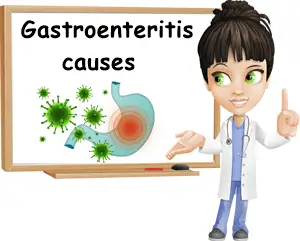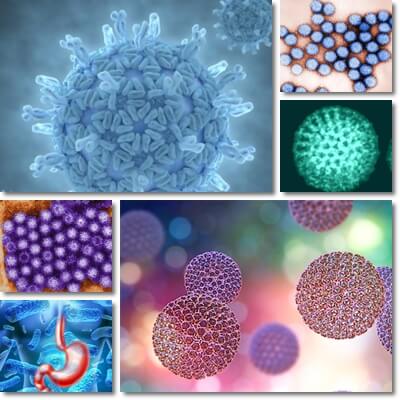Gastroenteritis, also known as the stomach flu, stomach virus or stomach bug is an inflammation of the mucous membranes that line the stomach and intestines. Symptoms include watery diarrhea, nausea and vomiting and often result in dehydration, low blood sugar levels, dizziness and possibly fainting. Certain age groups like children and the elderly as well as anyone with chronic diseases or immune system deficiencies are at higher risk for complications from gastroenteritis, the condition resulting in millions of deaths every year. Gastroenteritis is caused by infection with a virus, bacterium and more rarely, fungus or parasite and is highly infectious.
What causes gastroenteritis? Anything from contaminated water, contaminated food, direct contact with someone with a stomach virus or bug or the objects that person has touched, yard work or playing in sand or dirt in the case of children can spread the infection. Not washing hands, especially before eating, touching your mouth or nose with dirty hands, biting nails, picking your teeth with your fingernails, being in day care or school, sharing personal objects, swimming in pools where the water is not properly disinfected and any essentially any direct or indirect exposure to stools of infected people can cause gastroenteritis.

There are actually four different types of infectious gastroenteritis, each named after the causative agent:
1) Viral gastroenteritis, also colloquially called the stomach flu or stomach virus. Is caused by infection with rotavirus, norovirus, adenovirus, astrovirus and sapovirus. It is fairly common in both children and adults and requires careful management of symptoms to prevent complications, especially in risk categories (babies, children, the elderly, anyone with a chronic condition).
2) Bacterial gastroenteritis, informally called the stomach bug. It is more common in adults than children and caused by various strains of Escherichia, Salmonella, Clostridium or Campylobacter bacteria. Traveler’s diarrhea is a form of bacterial gastroenteritis.
3) Fungal gastroenteritis. It is caused by infection with various molds and is seen primarily in people with immune system deficiencies. It is more common in those with existing stomach ulcers because the molds tend to colonize the damaged stomach lining easier. Children, anyone doing yard work or taking proton pump inhibitor medication for extended periods of time for gastritis or peptic ulcers has higher risks for fungal gastroenteritis.
4) Parasitic gastroenteritis. Just as common is developed and underdeveloped countries. It is caused by infection with intestinal parasites and worms such as giardia from drinking water or swimming pools. Traveler’s diarrhea that is severe and does not respond to antibiotics is likely caused by intestinal parasites.
How long does gastroenteritis (aka the stomach flu) last? The typical duration of a gastroenteritis is 3-7 days. Symptoms may appear within 12-72 hours following infection. In the case of viral and bacterial gastroenteritis, symptoms may last a minimum of 48 to 72 hours. Severe forms can last up to 10 days and beyond. Fungal and parasitic gastroenteritis can have undetermined duration, depending on the life cycle of the respective infectious agent and its response to treatment.

List of symptoms
What are gastroenteritis symptoms? Infection causes inflammation of the gastrointestinal tract and it is this inflammation that produces symptoms such as:
1) Diarrhea, usually severe, causing loose, watery stools.
2) Diarrhea with blood when the cause is bacterial and the infection severe.
3) Abdominal pain, especially cramps from diarrhea.
4) Nausea and vomiting.
5) Dehydration as a result of the diarrhea and vomiting.
6) Hypoglycemia which can lead to dizziness and fainting.
7) Feeling of unwell, fatigue, muscle weakness and pain.
8) Fever, usually high, decreases for a short while after vomiting.
9) Mild shivering or chills alternating with the fever.
10) Heartburn, bad, metallic or acidic taste in the mouth.
These occur as a result of the vomiting bringing stomach acid into the esophagus.
11) Dry mouth, dry throat and lethargy.
All symptoms may be present or only a few. Some people have gastroenteritis without diarrhea and only fever and vomiting, others have both diarrhea and vomiting or diarrhea and nausea without vomiting. Muscle weakness and fatigue may differ in intensity from person to person. Diarrhea with blood is not common, but does occur in severe gastroenteritis of bacterial causes and require immediate medical attention. Gastroenteritis may not allow you to eat or drink fluids or keep food and water down at all in the first day. As soon as the infectious agent has incubated, vomiting and diarrhea prevent eating and drinking. The risk with this is dehydration which can easily lead to complications, especially for children, the elderly and chronically ill people.
It is expected for people with gastroenteritis to not be able to eat anything for the first day and very little in the first three days. However, it’s important to be able to drink fluids because the continual diarrhea and vomiting will cause dehydration which can have serious outcomes. If vomiting is severe, antiemetic medication is recommended to be able to retain fluids and prevent complications. As symptoms start improving, bland foods that are easy to digest should be introduced slowly, one by one and in small amounts. Salted crackers, a teaspoon of honey (if you are not allergic), a ripe banana, plain boiled rice, applesauce or a fresh, chilled apple are the best foods to eat when you have gastroenteritis. If the nausea returns, stop eating for the moment until you feel hungry again or your appetite returns.
Gastroenteritis treatment options
Recovering from gastroenteritis should occur naturally and typically no treatment is recommended. This is because the immune system is perfectly capable of eliminating the stomach bug by itself. However, for severe symptoms that prevent eating and drinking or don’t allow you to keep any liquids down, antiemetics for relieving nausea and antipyretics for reducing fever can be taken as part of the symptoms management strategy. Diarrhea should be left to continue because it’s the body’s natural defense response and helps eliminate the infectious agent from the gastrointestinal tract. If symptoms are severe, don’t improve or the cause is bacterial, your doctor may prescribe antibiotics or intravenous fluids.
Other advice for managing gastroenteritis in adults
1) Try to drink more fluids than usual to combat dehydration from vomiting and diarrhea. Best options for rehydration in gastroenteritis include: still water, naturally sparkling water which contains minerals/electrolytes (sodium, magnesium, potassium, calcium), oral rehydration solution which is added to a glass of water, clear chicken soup, home-made fruit juices of your choice, peppermint tea, ginger tea either unsweetened or sweetened with brown sugar or raw honey unless allergic, water flavored with lemon juice to help with the nausea.
2) Avoid coffee, caffeinated beverages, green tea, black tea, white tea which contain caffeine, milk, energy drinks, vinegar, most fizzy or carbonated drinks and alcohol. They dehydrate and irritate the stomach even further. Although, for some people, taking a few sips of a preferred carbonated beverage may help reduce nausea.
3) Gastroenteritis diet plan is a two part system that includes foods to eat when you have gastroenteritis and foods to eat after gastroenteritis.
– What to eat when you have gastroenteritis. The first day it’s likely you won’t not be able to eat anything or close to anything or keep down any food you might be able to eat. If this is the case, focus on drinking fluids. As soon as you can eat, choose bland foods that are easy to digest and eat small amounts. The best foods for gastroenteritis include salted crackers, toast with a little honey (check for allergies), plain boiled rice, a fresh, chilled apple or applesauce, a ripe banana and clear soup.
– What to eat after gastroenteritis. After the main symptoms start to improve, you can introduce other foods into you diet. Complete chicken soup (liquid, boiled vegetables and lean meat), soft-boiled eggs or poached eggs with toast, plain pasta with ground chicken meat (no heavy tomato sauces, no red meat), cooked vegetables, boiled lean fish (aurata, but not tuna or salmon), ripe bananas, applesauce, plain mashed potatoes (no milk, no butter, just salt) and, optional, plain yogurt (small portions), sweet cottage cheese (small portions). Returning to your normal diet should be done gradually.
– What foods to avoid in gastroenteritis. It’s important to avoid spicy foods, heavily flavored dishes, fried foods and high-fat foods, all processed foods, chocolate, candy, pastries etc. Avoid heavy meals and large portions. Eat small amounts of food often and drink plenty of fluids.
4) Effervescent vitamin C can help increase appetite and temporarily reduce nausea, especially if it’s unsweetened. Natural vitamin C from rose hip or acerola cherry mixed with water can help.
5) Eating a little honey can help prevent hypoglycemia in gastroenteritis. Manuka honey MGO 400+ is the best choice because it has a calming effect on the stomach as well as antibacterial properties (see article on Manuka Honey MGO, UMF, KFactor). But any raw honey is good (see Honey varieties). However, make sure you get certified raw honey that is unprocessed and tested for heavy metals, molds and bacteria. Also, if you are allergic to honey, pollen or bee products in general, avoid eating honey.
6) Bed rest is highly recommended to help you get through the symptoms with as little complications as possible. Also, it’s important to stay home to avoid spreading the stomach bug to others. Children should be taken out of day care and school for the duration of the recovery for both their benefit and the benefit of others.
Gastroenteritis in children
If your child has the stomach flu, make sure they stay at home and rest, drink enough fluids or take rehydration solutions if needed and eat as soon as they can, even as little as possible. Manage their fever, nausea and vomiting for a faster recovery and to avoid complications. If vomiting continues for more than 24 hours and is severe, diarrhea persists for more than 48 hours and is also severe, fever is high or does not break, contact your doctor. This is also true for adults. Watch out for symptoms such as difficulty breathing, unusual thirst, dry mouth and lips, dry skin, confusion, lethargy, dizziness, blurred vision and infrequent or complete lack of micturition. These are signs of severe dehydration and other complications of gastroenteritis and require medical intervention. For gastroenteritis in infants, it is recommended to continue nursing and contact your doctor for advice as soon as symptoms start.
